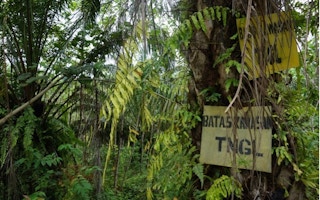Agriculture is one of the key drivers of economic development in Southeast Asia, a region home to around 100 million farmers. Their role in supporting food systems and rural livelihood puts smallholder farming in a strategic position to promote sustainable agricultural practices. For which, sustainability certifications often become the “gold standard” with their market mechanism approaches.
The key component of sustainable certifications is traceability. Through traceability, producers and consumers could ensure that the agricultural products they purchase come from sustainable and deforestation-free sources. In theory, traceability allows the identification of each stage of value chain through the chain of custody, requiring stringent administrative processes.
Despite contributing significantly to the agricultural production, however, smallholders often could not access these sustainability certifications due to the lack of traceability. While considered efficient and trustworthy, traceability solutions may not work at the smallholder level.
Various factors influence the implementation of smallholder traceability. We identify at least three common challenges that prevent smallholder traceability and ways to navigate around these challenges.
“
With consumers being increasingly more conscious of what they purchase, demand for eco- and sustainable labelling from certification providers will constantly increase. Therefore, smallholder inclusion in traceability will create incremental changes towards achieving sustainable agricultural practices.
Tenurial security
It might be counterintuitive but not all farmers have their land tenure secured due to various reasons, from land administration to social construction. Since land registration is often required for traceability, smallholders without tenure security may not be eligible for sustainability certification schemes.
Many farmers lose rights to farmlands and forest and grazing areas to land grabbing and forest demarcation. In postcolonial Southeast Asia, for instance, many local communities gave up their lands to the colonial power and then to the state upon independence that gazetted the lands as forest areas or for large infrastructure projects, depriving their access to the long-managed lands.
Furthermore, social constructions can affect tenurial security. Within patriarchal system, female farmers are more vulnerable to tenurial insecurity as land title deeds are often registered under the male considered as the head of the household. When the (male) land holders pass, the land legacy often benefits the male members of the family.
Ensuring tenurial rights to smallholders is, thus, key to achieving traceability. Such rights can be given either through ownership or management rights.
While agrarian reform can address land ownership issue, in some cases, community-based forest management can lead to restoration of tenure security through management rights. In this case, sustainability certification providers should also consider recognising the varying tenurial rights over forest areas so more smallholders could gain access to certifications.
Farmer-middlemen relations
There are many accountability issues with the agricultural value chain that rely on middlemen as smallholders’ key access to market. Smallholder agriculture is often characterised by the long value chain that involves multiple layers of middlemen or traders.
In each layer, middlemen will have access to smallholders to source the commodities and larger middlemen or buyers to resell the aggregated yields with price margins incurred at each stage, causing low farm-gate prices.
It is also quite common for the middlemen to mix commodities from sustainable and conventional farming practices to meet the demand for agricultural commodities, often at the expense of traceability.
And yet, one question remains: should we exclude middlemen to achieve traceability? Maybe not, especially when no immediate and more transparent alternative is available, as excluding middlemen may limit smallholders’ market access.
Despite the transparency and accountability issues, middlemen are often an integral part of the farming community themselves that operate within their socio-cultural settings. In such a scenario, removing middlemen from the value chain may not be viable as social and cultural norms may constrain smallholders from detaching from middlemen.
Instead of excluding middlemen, therefore, we should incrementally transform their approach, at least in the medium-term. One strategy to increase accountability is by having a registration system for middlemen, so we know who the players are and where they are sourcing from. Malaysia has been doing the registration of middlemen in the palm oil industry that is beneficial for their traceability.
Low internet and digital penetration
Although the global internet and digital penetrations increase rapidly, many people in developing countries, especially rural farmers, still lack access to such technologies. Prices and infrastructural readiness are among the reasons of such low penetrations.
When it comes to traceability, technological advancement is quite central where the providers use various solutions, such as geospatial tagging and digital record keeping. However, these solutions may not effectively reach the smallholders due to the lack of access to such technologies.
To ensure smallholder inclusion, value chain interventions should work around these limitations. For example, instead of digitalising the information at the individual smallholder level, traceability solutions could digitalise the aggregated data at the group’s level. Such an arrangement can cut transaction costs and accommodate those lacking access to the digital technologies.
Ways forward
These three interrelated challenges, however, do not provide a complete picture of the complexities of the smallholder value chain. But it helps give an understanding of the common issues preventing smallholder traceability.
The inclusion of all actors in the value chain is detrimental to achieving smallholder traceability. Being traceable means that smallholders will be able to expand their access to market and various technical and financial assistances to promote sustainable agricultural practices that are contributing positively to nature conservation.
With consumers being increasingly more conscious of what they purchase, demand for eco- and sustainable labelling from certification providers will constantly increase. Therefore, smallholder inclusion in traceability will create incremental changes towards achieving sustainable agricultural practices.
Dimas Fauzi, a research associate at the Stockholm Environment Institute based in Bangkok, Thailand. This opinion piece was written exclusively for Eco-Business.











